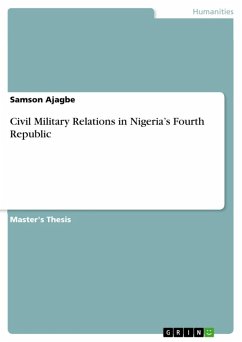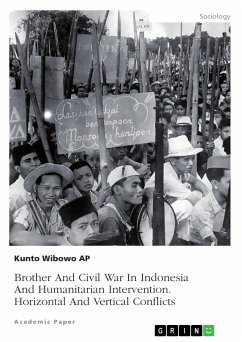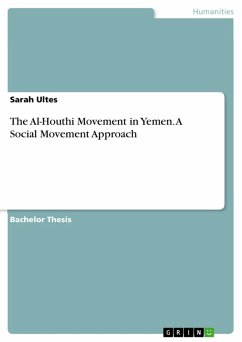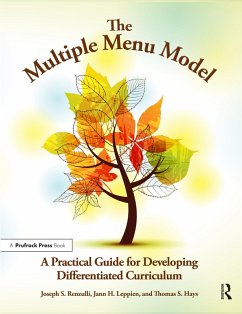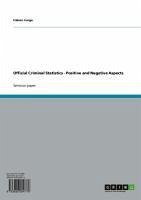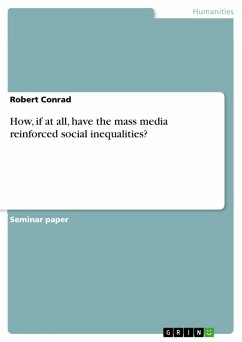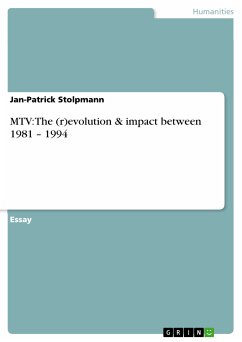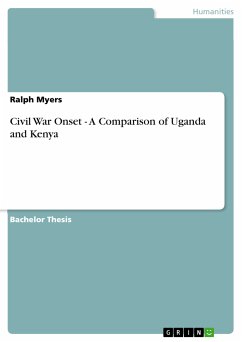
Civil War Onset - A Comparison of Uganda and Kenya (eBook, ePUB)
Versandkostenfrei!
Sofort per Download lieferbar
Statt: 17,95 €**
15,99 €
inkl. MwSt. und vom Verlag festgesetzt.
**Preis der gedruckten Ausgabe (Broschiertes Buch)
Alle Infos zum eBook verschenkenWeitere Ausgaben:

PAYBACK Punkte
0 °P sammeln!
Bachelor Thesis from the year 2010 in the subject Sociology - War and Peace, Military, grade: 73%, Dublin City University, course: International Relations, language: English, abstract: This paper poses the research question: what causes civil war? Since the end of World War II, both incidence and duration of civil wars have been on the rise, with disastrous outcomes for humanity. It is crucial that academics study this phenomenon and try to create theories which are able to explain and predict civil war onset for different countries. Two main competing theories have become prominent in the mod...
Bachelor Thesis from the year 2010 in the subject Sociology - War and Peace, Military, grade: 73%, Dublin City University, course: International Relations, language: English, abstract: This paper poses the research question: what causes civil war? Since the end of World War II, both incidence and duration of civil wars have been on the rise, with disastrous outcomes for humanity. It is crucial that academics study this phenomenon and try to create theories which are able to explain and predict civil war onset for different countries. Two main competing theories have become prominent in the modern day literature surrounding the outbreak of civil war. On the one hand there are "greed" theorists employing econometric models to account for rebel opportunism. These theories centre around the notion that ethno-linguistically or religiously diverse countries experience civil war as a result of the incentive to rebel compared to the state's ability to counter rebellion. Greed theories focus largely on the ability of rebel groups to recruit and finance themselves, in addition to a number of other variables, which make civil war more or less conducive. On the other side are advocates of the "grievance" theory who argue civil wars start as a result of grievances, built up as a result of political and material discrimination. Depending on the level of grievance in combination with the ability of ethnocultural groups to mobilise and the state's response to initial protest, civil war occurs. This paper focuses on two case studies, with opposing dependent variables. The first is Uganda which has experienced multiple internal conflicts of varying intensity since gaining independence. The other is Kenya which has been spared the outbreak of a full-blown civil war, although it has experienced a number violent ethnic clashes. The case studies are relatively similar so as to control for third variables, yet chosen in such a fashion as to avoid bias or case fixing. For both countries the greed model is firstly applied followed by a more in-depth look at whether the rationale behind the given independent variables corresponds with political-economic realities. The second part of each case study looks at the applicability of grievance based theories and which set of explanations holds more power with regards to civil war onset. The analysis of both models in the context of the two chosen case studies should determine which theory holds the most explanatory power in relation to civil war onset.
Dieser Download kann aus rechtlichen Gründen nur mit Rechnungsadresse in A, B, BG, CY, CZ, D, DK, EW, E, FIN, F, GR, HR, H, IRL, I, LT, L, LR, M, NL, PL, P, R, S, SLO, SK ausgeliefert werden.




